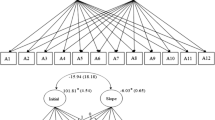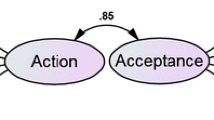Abstract
The effects of Acceptance and Commitment Group Therapy (ACGT) on social anxiety in Thai female undergraduates were investigated. A quasi-experimental pre-post treatment-control design was employed, with fifty-two community-sample participants. Twenty-six participated in the treatment group and attended the eight-session semi-weekly ACGT; the remaining were the no-treatment control group. Before and after the intervention and at 2- and 4-week follow-ups, all participants completed the measures of fears of negative evaluation, psychological flexibility, and social anxiety. Repeated-measures and between-groups MANOVAs were employed. Compared with at pre-intervention, the treatment group reported lower fears of negative evaluation and social anxiety but higher psychological flexibility at post-intervention and the two follow-ups. Compared with the control group, the treatment group also reported lower fears of negative evaluation at these periods. Significant group differences in social anxiety and psychological flexibility were observed later, at the 2- and 4-week follow-ups, respectively. ACGT was shown to alleviate fears of negative evaluation and social anxiety as well as to promote psychological flexibility. Therapeutic implications were discussed.


Similar content being viewed by others
References
American Psychiatric Association. (2013). Diagnostic and statistical manual of mental disorders (5th ed.). https://doi.org/10.1176/appi.books.9780890425596
Antony, M. M., & Swinson, R. P. (2000). Phobic disorders and panic in adults: A guide to assessment and treatment. American Psychological Association. https://doi.org/10.1037/10348-000
Arch, J. J., & Craske, M. G. (2009). First-line treatment: A critical appraisal of cognitive behavioral therapy developments and alternatives. Psychiatric Clinics of North America, 32(3), 525–547. https://doi.org/10.1016/j.psc.2009.05.001
Barnett, M. D., Maciel, I. V., Johnson, D. M., & Ciepluch, I. (2021). Social anxiety and perceived social support: Gender differences and the mediating role of communication styles. Psychological Reports, 124(1), 70–87. https://doi.org/10.1177/0033294119900975
Block, J. A., & Wulfert, E. (2000). Acceptance or change: Treating socially anxious college students with ACT or CBGT. The Behavior Analyst Today, 1(2), 3–10.
Bluett, E. J., Homan, K. J., Morrison, K. L., Levin, M. E., & Twohig, M. P. (2014). Acceptance and commitment therapy for anxiety and OCD spectrum disorders: An empirical review. Journal of Anxiety Disorders, 28(6), 612–624. https://doi.org/10.1016/j.janxdis.2014.06.008
Charernboon, T., & Lerthattasilp, T. (2015). Social anxiety disorder in Thailand: A comparative case study. the Proceedings of the 107th Neuropsychiatric Symposium, the Japanese Society of Psychiatry and Neurology.
Clark, D. M., Ehlers, A., Hackmann, A., McManus, F., Fennell, M., Grey, N., Waddington, L., & Wild, J. (2006). Cognitive therapy versus exposure and applied relaxation in social phobia: A randomized controlled trial. Journal of Consulting and Clinical Psychology, 74(3), 568–578. https://doi.org/10.1037/0022-006X.74.3.568
Clark, D. M., & Wells, A. (1995). A cognitive model of social phobia. In R. G. Heimberg, M. R. Liebowitz, D. A. Hope, & F. R. Schneier (Eds.), Social phobia: Diagnosis, assessment, and treatment (pp. 69–93). The Guilford Press.
Cohen, J. (1988). Statistical power analysis for the behavioral sciences ((2nd ed.). ed.). Laurence Erlbaum Associates.
Craske, M. G., Niles, A. N., Burklund, L. J., Wolitzky-Taylor, K. B., Vilardaga, J. C., Arch, J. J., Saxbe, D. E., & Lieberman, M. D. (2014). Randomized controlled trial of cognitive behavioral therapy and acceptance and commitment therapy for social phobia: Outcomes and moderators. Journal of Consulting and Clinical Psychology, 82(6), 1034–1048. https://doi.org/10.1037/a0037212
Dalrymple, K. L., Morgan, T. A., Lipschitz, J. M., Martinez, J. H., Tepe, E., & Zimmerman, M. (2014). An integrated, acceptance-based behavioral approach for depression with social anxiety: Preliminary results. Behavior Modification, 38(4), 516–548. https://doi.org/10.1177/0145445513518422
Dudsdeemaytha, J. (2005). Cognitive-behavioral therapy for social anxiety for reduction [Unpublished doctoral dissertation]. Srinakharinwirot University.
Eilenberg, T., Hoffmann, D., Jensen, J. S., & Frostholm, L. (2017). Intervening variables in group-based acceptance & commitment therapy for severe health anxiety. Behaviour Research and Therapy, 92, 24–31. https://doi.org/10.1016/j.brat.2017.01.009
England, E. L., Herbert, J. D., Forman, E. M., Rabin, S. J., Juarascio, A., & Goldstein, S. P. (2012). Acceptance-based exposure therapy for public speaking anxiety. Journal of Contextual Behavioral Science, 1(1-2), 66–72. https://doi.org/10.1016/j.jcbs.2012.07.001
Erikson, E. H. (1993). Childhood and society. WW Norton & Company (Original work published 1950).
Gloster, A. T., Walder, N., Levin, M. E., Twohig, M. P., & Karekla, M. (2020). The empirical status of acceptance and commitment therapy: A review of meta-analyses. Journal of Contextual Behavioral Science, 18, 181–192. https://doi.org/10.1016/j.jcbs.2020.09.009
Gregory, R. J. (2014). Psychological testing: History, principle, and application ((7th ed.). ed.). Pearson.
Hair, J. F., Black, W. C., Babin, B. J., & Anderson, R. E. (2013). Multivariate data analysis ((7 ed.). ed.). Pearson.
Halliburton, A. E., & Cooper, L. D. (2015). Applications and adaptations of Acceptance and Commitment Therapy (ACT) for adolescents. Journal of Contextual Behavioral Science, 4(1), 1–11. https://doi.org/10.1016/j.jcbs.2015.01.002
Hancock, K. M., Swain, J., Hainsworth, C. J., Dixon, A. L., Koo, S., & Munro, K. (2018). Acceptance and commitment therapy versus cognitive behavior therapy for children with anxiety: Outcomes of a randomized controlled trial. Journal of Clinical Child and Adolescent Psychology, 47(2), 296–311. https://doi.org/10.1080/15374416.2015.1110822
Hayes, L. L., & Ciarrochi, J. V. (2015). The thriving adolescent: Using acceptance and commitment therapy and positive psychology to help teens manage emotions, achieve goals, and build connection. .
Hayes, S. C., Luoma, J. B., Bond, F. W., Masuda, A., & Lillis, J. (2006). Acceptance and commitment therapy: Model, processes and outcomes. Behaviour Research and Therapy, 44(1), 1–25. https://doi.org/10.1016/j.brat.2005.06.006
Herbert, J. D., & Cardaciotto, L. (2005). An acceptance and mindfulness-based perspective on social anxiety disorder. In S. M. Orsillo & L. Roemer (Eds.), Acceptance and mindfulness-based approaches to anxiety: Conceptualization and treatment (pp. 189–212). Springer Science + Business Media. https://doi.org/10.1007/0-387-25989-9_8
Hoffmann, D., Rask, C. U., & Frostholm, L. (2019). Acceptance and commitment therapy for health anxiety. In E. Hedman-Lagerlöf (Ed.), The clinician’s guide to treating health anxiety: Diagnosis, mechanisms, and effective treatment (pp. 35–42). Elsevier Academic Press.
Hofmann, S. G., & Smits, J. A. (2008). Cognitive-behavioral therapy for adult anxiety disorders: A meta-analysis of randomized placebo-controlled trials. The Journal of Clinical Psychiatry, 69(4), 621–632. https://doi.org/10.4088/jcp.v69n0415
Khoramnia, S., Bavafa, A., Jaberghaderi, N., Parvizifard, A., Foroughi, A., Ahmadi, M., & Amiri, S. (2020). The effectiveness of acceptance and commitment therapy for social anxiety disorder: A randomized clinical trial. Trends in Psychiatry and Psychotherapy, 42(1), 30–38. https://doi.org/10.1590/2237-6089-2019-0003
Kirsch, A. T. (1977). Complexity in the Thai religious system: An interpretation. Journal of Asian Studies, 36(2), 241–266.
Kittirattanapaiboon, P., Tantirungsi, N., Chutha, W., Tanaree, A., Kwansanit, P., Assanangkornchai, S., Supanya, S., & Thai Mental Health Survey Working Group. (2016). Prevalence of mental disorders and mental health problems: Results from Thai national mental health survey 2013. Beyond. https://www.dmh.go.th/ebook/files/prevalence_of_M_disorder_MH_problems_TNMHS2013.pdf. Accessed 29 Mar 2019.
Kocovski, N. L., Fleming, J. E., Hawley, L. L., Ho, M.-H. R., & Antony, M. M. (2015). Mindfulness and acceptance-based group therapy and traditional cognitive behavioral group therapy for social anxiety disorder: Mechanisms of change. Behaviour Research and Therapy, 70, 11–22. https://doi.org/10.1016/j.brat.2015.04.005
Krause, M. S., & Howard, K. I. (2003). What random assignment does and does not do. Journal of Clinical Psychology, 59(7), 751–766. https://doi.org/10.1002/jclp.10170
Leary, M. R. (1983). A brief version of the Fear of Negative Evaluation Scale. Personality and Social Psychology Bulletin, 9(3), 371–375. https://doi.org/10.1177/0146167283093007
Leary, M. R., & Kowalski, R. M. (1993). The Interaction Anxiousness Scale: Construct and criterion-related validity. Journal of Personality Assessment, 61(1), 136–146. https://doi.org/10.1207/s15327752jpa6101_10
Levin, M. E., Krafft, J., Hicks, E. T., Pierce, B., & Twohig, M. P. (2020). A randomized dismantling trial of the open and engaged components of acceptance and commitment therapy in an online intervention for distressed college students. Behaviour Research and Therapy, 126, 103557. https://doi.org/10.1016/j.brat.2020.103557
MacKenzie, M. B., & Kocovski, N. L. (2010). Self-reported acceptance of social anxiety symptoms: Development and validation of the Social Anxiety—Acceptance and Action Questionnaire. International Journal of Behavioral Consultation and Therapy, 6(3), 214–232. https://doi.org/10.1037/h0100909
Markus, H. R., & Kitayama, S. (1994). A collective fear of the collective: Implications for selves and theories of selves. Personality and Social Psychology Bulletin, 20(5), 568–579. https://doi.org/10.1177/0146167294205013
Mayers, A. (2013). Introduction to statistics and SPSS in psychology (Vol. 28). Pearson.
National Collaborating Centre for Mental Health (UK). (2013). Social anxiety disorder: Recognition, assessment and treatment. British Psychological Society (UK).
Niles, A. N., Burklund, L. J., Arch, J. J., Lieberman, M. D., Saxbe, D., & Craske, M. G. (2014). Cognitive mediators of treatment for social anxiety disorder: Comparing acceptance and commitment therapy and cognitive-behavioral therapy. Behavior Therapy, 45(5), 664–677. https://doi.org/10.1016/j.beth.2014.04.006
Ossman, W. A., Wilson, K. G., Storaasli, R. D., & McNeill, J. R. (2006). A preliminary investigation of the use of acceptance and commitment therapy in group treatment for social phobia. International Journal of Psychology and Psychological Therapy, 6(3), 397–416.
Poonyakanok, T., & Tuicomepee, A. (2011). Review article: Stigma in context of professional psychological help seeking. Journal of Mental Health of Thailand, 19(1), 66–74.
Rosser, S., Erskine, A., & Crino, R. (2004). Pre-existing antidepressants and the outcome of group cognitive behaviour therapy for social phobia. Australian and New Zealand Journal of Psychiatry, 38(4), 233–239. https://doi.org/10.1111/j.1440-1614.2004.01345.x
Ruiz, F. (2010). A review of Acceptance and Commitment Therapy (ACT) empirical evidence: Correlational, experimental psychopathology, component and outcome studies. International Journal of Psychology and Psychological Therapy, 10(1), 125–162.
Sandoz, E. K., Kellum, K. K., & Wilson, K. G. (2017). Feasibility and preliminary effectiveness of acceptance and commitment training for academic success of at-risk college students from low income families. Journal of Contextual Behavioral Science, 6(1), 71–79. https://doi.org/10.1016/j.jcbs.2017.01.001
Sandstrom, G. M., & Dunn, E. W. (2014). Social interactions and well-being: The surprising power of weak ties. Personality and Social Psychology Bulletin, 40(7), 910–922. https://doi.org/10.1177/0146167214529799
Schreier, S. S., Heinrichs, N., Alden, L., Rapee, R. M., Hofmann, S. G., Chen, J., Oh, K. J., & Bögels, S. (2010). Social anxiety and social norms in individualistic and collectivistic countries. Depression and Anxiety, 27(12), 1128–1134. https://doi.org/10.1002/da.20746
Shadish, W., Cook, T. D., & Campbell, D. T. (2002). Experimental and quasi-experimental designs for generalized causal inference. Houghton Mifflin.
Siripanit, K. (2016). The mediating role of psychological flexibility in the relationship between social anxiety and psychological well-being in undergraduates [Master’s Thesis, Chulalongkorn University]. Chulalongkorn University Intellectual Repository. https://cuir.car.chula.ac.th/handle/123456789/55118. Accessed 29 Mar 2019.
Stoddard, J. A., & Afari, N. (2014). The big book of ACT metaphors: A practitioner’s guide to experiential exercises and metaphors in Acceptance and Commitment Therapy.
Uğur, E., & Koç, M. (2021). The effectiveness of acceptance and commitment therapy based psychoeducation program in reducing fear of negative evaluation. Turkish Psychological Counseling and Guidance Journal, 11(60), 101–110.
Watson, D., & Friend, R. (1969). Measurement of social-evaluative anxiety. Journal of Consulting and Clinical Psychology, 33(4), 448–457. https://doi.org/10.1037/h0027806
Yadegari, L., Hashemiyan, K., & Abolmaali, K. (2014). Effect of acceptance and commitment therapy on young people with social anxiety. International Journal of Scientific Research in Knowledge, 2(8), 395–403.
Yalom, I. D., & Leszcz, M. C. (2005). The theory and practice of group psychotherapy ((5th ed.). ed.). Basic Books.
Funding
This research was funded by the 90th Anniversary of Chulalongkorn University Scholarship, Graduate School, Chulalongkorn University.
Author information
Authors and Affiliations
Corresponding author
Ethics declarations
Competing Interests
The authors declare no competing interests.
Additional information
Publisher’s Note
Springer Nature remains neutral with regard to jurisdictional claims in published maps and institutional affiliations.
Rights and permissions
Springer Nature or its licensor (e.g. a society or other partner) holds exclusive rights to this article under a publishing agreement with the author(s) or other rightsholder(s); author self-archiving of the accepted manuscript version of this article is solely governed by the terms of such publishing agreement and applicable law.
About this article
Cite this article
Srichan, C., Yingsoong, A. & Pisitsungkagarn, K. The Effects of Acceptance and Commitment Group Therapy on Social Anxiety, Fears of Negative Evaluation, and Psychological Flexibility: an Initial Study in Thai Female Undergraduates. Int J Adv Counselling 45, 687–707 (2023). https://doi.org/10.1007/s10447-023-09524-1
Accepted:
Published:
Issue Date:
DOI: https://doi.org/10.1007/s10447-023-09524-1




